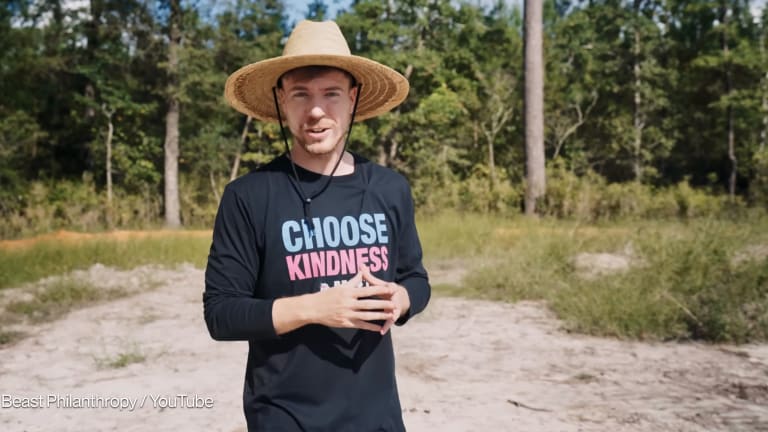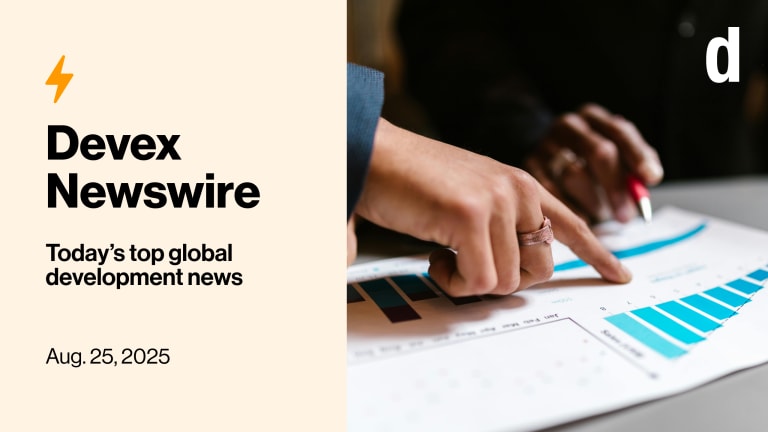Who’s behind the billions flowing into philanthropy?
With client lists that include MacKenzie Scott, the Bill & Melinda Gates Foundation, the Rockefeller Foundation, and groups such as Unlock Aid, philanthropy advisory firms are growing in size and influence. But what exactly do they do?
Years before joining the world of advisers guiding wealthy people and foundations on how and where to give away their money, Gabrielle Fitzgerald learned about the vast gulfs between various philanthropic approaches from two billionaires whose giving habits couldn’t be more different: Microsoft co-founders Bill Gates and Paul Allen. Fitzgerald spent nearly a decade at the Bill & Melinda Gates Foundation, where everything is meticulously planned out. She started as a senior program officer before eventually directing strategy-making for global programs. In 2014 she left to run the Paul G. Allen Foundation’s $100 million Ebola program. She found that the two organizations had “two very different brands of philanthropy.” At the Gates Foundation everything is very planned out, she said, noting the various strategies and grantmaking portfolios. The organization is known for its data-driven initiatives in global health, agriculture, and education. Paul Allen’s philanthropy, by contrast, “was very whimsical,” with some strategy decisions prompted by news articles rather than research or expertise provided by staff, according to Fitzgerald. With those two experiences under her belt, Fitzgerald decided to start her own philanthropic advisory firm, Panorama Global, in 2017. Her Seattle-based consultancy is among the many advisory firms whose power and influence have grown along with the rise of the super wealthy. Traditionally, foundations have had their own in-house advisory teams. Now, these firms are providing those services a la carte, often catering to a class of philanthropists who don’t necessarily want to start foundations and want to be nimbler with their giving. The firms’ ever-expanding client lists include billionaires, corporations, foundations, and non-traditional funders who are looking for new and more innovative ways to give to global causes such as ending world hunger, expanding access to education, and fighting climate change. Arabella Advisors, The Bridgespan Group, and Rockefeller Philanthropy Advisors, or RPA, are among the most prominent firms steering tens of billions of dollars toward these issues. In many ways, the firms are akin to high-school guidance counselors in that they present clients with strategies and blueprints for how they might approach their futures — in this case, their charitable work — without telling them exactly what to do or claiming to know all of the answers. Advisers help donors identify causes and organizations that are “in sync” with their giving goals, said Thad Calabrese, a professor of public and nonprofit management at New York University. While services such as GuideStar and Charity Navigator provide some free and basic information about nonprofits, comprehensive details can be “difficult to come by,” he said. For the general public, “the information is not as easily accessible as it is for a publicly traded company,” Calabrese said. Working with an advisory firm can help funders make sure they are giving their money to an organization that is “worthy of it and will handle the money well.” How philanthropic advisory firms began Many of the most influential advisory firms emerged in the early 2000s alongside a new crop of philanthropists, many of them from the tech industry. Ironically, some of these firms originated within major foundations. RPA, one of the better-known firms, is a spinoff of the in-house advising team created by wealthy American industrialist John D. Rockefeller in the late 19th century to “manage his philanthropic efforts.” RPA came about because people would “knock on the doors” of wealthy philanthropists like the Rockefeller family asking them how they developed their philanthropic approach, which demonstrated the demand for such services, said Amir Pasic, dean of Indiana University’s Lilly Family School of Philanthropy. “At the turn of the century was the beginning of this emergence of systemization of advisory knowledge for high-net-worth individuals and foundations,” he said. Today the New York-based RPA manages more than $400 million in annual giving from individuals, families, corporations, and foundations, and has offices around the world. Another top firm is Boston-based Bridgespan Group, a nonprofit spin-off of the for-profit Bain & Company consulting firm. Its clients include the Gates Foundation, the Ford Foundation, and billionaire philanthropist MacKenzie Scott. Scott, who was previously married to Amazon founder Jeff Bezos, has famously given away more than $14 billion, mostly since 2020, without ever establishing her own foundation. To do this, she has relied on the staff at her Lost Horse LLC family office as well as outside advisers at Bridgespan. Her gifts are distributed through donor-advised funds, which is an investment account that can be set up at a public charity such as Fidelity Charitable for the sole purpose of making charitable donations. Scott has said that her giving is driven by the desire to begin “ceding” power to underrepresented and marginalized groups. That approach aligns with Bridgespan’s stated principles as a “mission-oriented” entity that wants to help the world “become a more just and equitable place,” William Foster, the firm’s managing partner, told Devex. “We are very focused on creating a bridge between capital providers and social change leaders to do things in more effective ways, in ways that are more proximate to the leaders or the problems in more fully funded ways,” he said. It is in this way that the six advisers interviewed for this piece say that they differentiate themselves from wealth advisers, who might be more concerned about tax write-offs and high returns on investment plans rather than ensuring their clients engage with social issues in a meaningful way. Filling a gap in philanthropy For Fitzgerald, Panorama Global marries two of her passions — philanthropy and politics. Before she landed at Gates, Fitzgerald cut her teeth in the world of U.S. politics. In the early 1990s, she joined the presidential campaign for a then-relatively unknown Arkansas governor named Bill Clinton. She eventually became a White House speechwriter before moving over to a communications role at the United States Agency for International Development. She helped lead the agency’s public affairs work on HIV/AIDS, Africa, and humanitarian responses. After leaving the Allen Foundation, Fitzgerald said she “stepped back” to think about where she wanted to go next in her career. There was “a gap” in the philanthropy universe for an enterprise that could function as a “one-stop shop for social change,” she said. Fitzgerald created Panorama Global with the goal of providing “traditional” consulting services and also serving as a “neutral platform” where funders could work collaboratively. It was an opportunity to share what she’d learned about strategy and management from both the public and private sectors. She now employs more than 130 staff members, which she said is an "even split" between core employees and those working on fiscally sponsored initiatives, meaning the funding is provided by donors while staffing is provided by Panorama. Her team does everything from managing portfolios to looking at “scalable solutions.” “Our whole mission statement is about making the most change happen,” she said. “If you keep drawing that out, we thought about what are the tools that we can provide that can help accelerate the pace of social change.” Among the organizations that Panorama Global has worked with so far are The Rockefeller Foundation, Wellcome, and Melinda French Gates’ philanthropic investment company Pivotal Ventures. Much of the firm's work focuses on bringing philanthropists together to tackle big issues such as the global eradication of Malaria. It advises collaborative efforts like Unlock Aid, a coalition of organizations advocating for overhauls to existing foreign aid practices. Bang for one’s buck The throughline between Panorama and most philanthropic consultancies is the emphasis on getting funders and partner organizations to push for systemic changes rather than singular issues as a way to expand the impact of their gifts. There are now dozens of smaller, more “niche” and philanthropic advisory firms focused on social impact, said Chirlie Felix, a managing director at FSG — formerly Foundation Strategy Group — who works with corporate and philanthropic clients on educational equity, corporate social responsibility, and strategic planning. Unlike many other philanthropic firms, FSG does not work with families and individual donors. Instead, its client lists include foundations and companies like Lululemon Athletica, The Dow Chemical Company, and AB InBev, the world’s largest beer producer. As part of her current work, Felix is helping corporate leaders maintain their pledges on equity, sustainability, and other areas — even amid the “unsettling and ambiguous environment” caused by fears of a global recession and the so-called anti-woke backlash that has followed the 2020 racial reckoning, she said, during which many companies and foundations issued diversity, equity, and inclusion pledges. “For us, at the very core of who we are at FSG, is the focus on social impact and in particular what we call equitable systems change,” she said. Some of the firm’s recent publications include a report on the different ways foundations can work to change systems linked to social or environmental issues and a guide on how CEOs can advance racial equity through their philanthropy and within their workplace. One of FSG’s goals is to show CEOs how they can incorporate commitments to racial equity “across their entire enterprise,” Felix said. Philanthropic advisory firms are also leading the sector on impact investing, the practice of making investments in companies or organizations with the goal of creating social and environmental benefits as well as financial returns. Nearly all of the firms Devex interviewed offered impact investment services. Generally speaking, “investment” is a word that is being used more often among philanthropists, especially in the U.S. and Europe, even if they do “pure grantmaking,” according to Alejandro Álvarez von Gustedt, the vice president of RPA’s European operations. Many grantmakers are managing their funds with a focus on returns, just as they would an investment, he said. In those cases the returns they are looking to see if their funding has had “real impacts” on targeted issue areas, he told Devex. But he cautioned that impact investing has its limits. The business model approach doesn’t work in all areas, but it’s a positive sign that philanthropists are looking for new ways to do good, he said. “Most people in this space are dissatisfied with the impact they’re having. And they’re trying to see what are the best tools and how can we make more out of our resources — financial and non-financial,” he said. Finding meaning in the giving Advisers say it is also essential to help philanthropists find meaning and self-fulfillment in what they are doing. For donors to want to give — and to give more to causes — it is key that they see the psychological benefits, according to professor Jen Shang, who bills herself as “the world’s only philanthropic psychologist.” She co-directs the Institute for Sustainable Philanthropy, a British philanthropic research organization. While it’s not a philanthropic advisory firm, it’s part of the universe of groups helping funders figure out how to donate their money. Shang recently stood in a packed ballroom in London and explained the central questions that spurred the Institute for Sustainable Philanthropy’s latest study of donor behavior, “Meaningful Philanthropy in the 21st Century: The Role of Self.” The study is based on interviews with 48 high- and ultra-net-worth individuals. All participants in the study had more than $1 million in assets, and more than half had more than $20 million. Wealthy donors are more willing to give by “growing the meaningfulness for each philanthropic experience for them,” Shang enthusiastically told the audience. ISP’s study looked at the “psychological challenges” that wealthy people must overcome to give and give more, which can vary from person to person. Those challenges can include “fights with their egos,” which can be especially tricky for entrepreneurs who have led successful businesses and are entering the sector as ideas about power-sharing and equity between donors and grantees gain popularity. “Any surface-level effort to convince them to give up control has little chance of success because it fundamentally goes against who they are,” Shang said at the London event. Helping donors identify which causes speak to them or which styles of giving fit their identities and backgrounds can be beneficial to “trusted advisers” with whom donors consult, she later told Devex in an interview. Scrutiny of philanthropic advisers Yet while many advisers see themselves as doing good, their work as charity ushers has sometimes been viewed with skepticism and wariness. Critics raised concerns about a conflict of interest when it was revealed that MacKenzie Scott had made a $40 million donation to Bridgespan in 2020 after becoming its client. Bridgespan “should not be on this list of gifts,” Megan Ming Francis, a political science and law professor at the University of Washington, tweeted in 2021. The firm shouldn’t be among grantees for “a whole host of reasons” but mostly because of the conflict of interest, she added. Bridgespan later issued a statement explaining that “we did not have prior knowledge of or involvement with the decision to include Bridgespan as a grant recipient.” FSG and RPA also have received gifts from Scott. Another influential firm, the for-profit Arabella Advisors, has faced scrutiny due to its work with anonymous donors giving untraceable donations to U.S. campaigns. The firm was referred to as “the left’s dark-money manager” in a 2021 news story from The Atlantic. Its clients include the New Venture Fund and the Sixteen Thirty Fund. The New Venture Fund is a public charity that pushes policy changes in the U.S. in areas such as tax laws and the criminal justice system and also funds global development and health work. The domestically-focused Sixteen Thirty Fund provides funding to groups that advocate for U.S. policy changes, such as the adoption of national paid sick and family leave requirements. However, Arabella has noted that both organizations are “fiscal sponsor clients,” meaning the firm provides operational and administrative support such as helping to execute grantmaking programs and managing hiring processes — but is not involved in fundraising or developing the missions, strategies, or programmatic work. “Arabella Advisors is not a funder, a political organization, or a nonprofit,” spokesperson Steve Sampson said in an email to Devex. Arabella, which recently acquired Redstone Strategy Group, is a certified B Corporation, a designation given to for-profit companies in the U.S. that focus on both “mission and profit,” Sampson said. And it “provides support for people and organizations that are working to build a better future — one with healthy air, water, and food for all, with strong democracies and engaged citizens, with flourishing communities, expanded opportunity and enhanced equity,” he added. Panorama also provides fiscal sponsorship for funders who choose to leave the administrative work of giving money, such as hiring staff to oversee the work, to someone else. And Fitzgerald said she will soon launch a division for political advocacy groups called Panorama Action “based on the idea that, again, if you need all the tools in the toolkit in one place, political advocacy is obviously a key tool in the toolkit.” “I wanted to create an entity that gave us the space where if we saw a gap, we could take the initiative to develop a program to fill it,” she said. “I’m very excited about what we’re doing. I love the diversity of issues and partners that we work with,” she added. “We really see ourselves as kind of in service of social impact, and we want to support people that are trying to make change happen.”
Years before joining the world of advisers guiding wealthy people and foundations on how and where to give away their money, Gabrielle Fitzgerald learned about the vast gulfs between various philanthropic approaches from two billionaires whose giving habits couldn’t be more different: Microsoft co-founders Bill Gates and Paul Allen.
Fitzgerald spent nearly a decade at the Bill & Melinda Gates Foundation, where everything is meticulously planned out. She started as a senior program officer before eventually directing strategy-making for global programs. In 2014 she left to run the Paul G. Allen Foundation’s $100 million Ebola program.
She found that the two organizations had “two very different brands of philanthropy.”
This story is forDevex Promembers
Unlock this story now with a 15-day free trial of Devex Pro.
With a Devex Pro subscription you'll get access to deeper analysis and exclusive insights from our reporters and analysts.
Start my free trialRequest a group subscription Printing articles to share with others is a breach of our terms and conditions and copyright policy. Please use the sharing options on the left side of the article. Devex Pro members may share up to 10 articles per month using the Pro share tool ( ).
Stephanie Beasley is a Senior Reporter at Devex, where she covers global philanthropy with a focus on regulations and policy. She is an alumna of the UC Berkeley Graduate School of Journalism and Oberlin College and has a background in Latin American studies. She previously covered transportation security at POLITICO.








